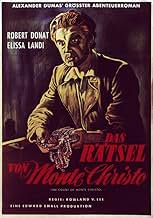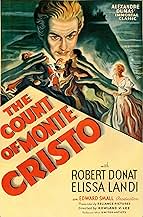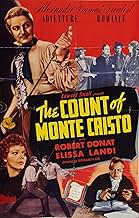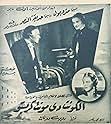NOTE IMDb
7,4/10
3,6 k
MA NOTE
Ajouter une intrigue dans votre langueAfter greedy men have Edmond Dantes unjustly imprisoned for 20 years for innocently delivering a letter entrusted to him, he escapes to get his revenge on them.After greedy men have Edmond Dantes unjustly imprisoned for 20 years for innocently delivering a letter entrusted to him, he escapes to get his revenge on them.After greedy men have Edmond Dantes unjustly imprisoned for 20 years for innocently delivering a letter entrusted to him, he escapes to get his revenge on them.
- Réalisation
- Scénario
- Casting principal
- Récompenses
- 3 victoires au total
Avis à la une
This excellently made picture is one that those you can watch over and over again. It's not however going to be anyone's all time favourite because you can't help feeling that it could have been a bit better. It's a great film but the extra magic which a film like this should have seems missing.
It was the STAR WARS of its day. It's a proper big budget, exciting adventure story and although it's as old to us now as it was to the makers of this film from the writing of the novel, it's still the most accessible and easiest to watch. There are none of the old fashioned traits of silent movies sometimes seen in some 1930s films in this. Perhaps it's because it's set in the past but the style of acting feels absolutely perfect for a story like this. It's almost a classic.
Although as a film it's faultless, in the hands of a different director I am sure it could have been even better. The themes of vengeance, justice and hope are explored well but they don't quite engage on an emotional level. Had this been made by someone like David Lean - or possibly even by Michael Curtiz or George Cukor, the nuances of those themes could have spoken to our hearts rather than just to our heads. There's nothing wrong with this film at all, it's just lacks that spark of magic to raise it to the next level.
It was the STAR WARS of its day. It's a proper big budget, exciting adventure story and although it's as old to us now as it was to the makers of this film from the writing of the novel, it's still the most accessible and easiest to watch. There are none of the old fashioned traits of silent movies sometimes seen in some 1930s films in this. Perhaps it's because it's set in the past but the style of acting feels absolutely perfect for a story like this. It's almost a classic.
Although as a film it's faultless, in the hands of a different director I am sure it could have been even better. The themes of vengeance, justice and hope are explored well but they don't quite engage on an emotional level. Had this been made by someone like David Lean - or possibly even by Michael Curtiz or George Cukor, the nuances of those themes could have spoken to our hearts rather than just to our heads. There's nothing wrong with this film at all, it's just lacks that spark of magic to raise it to the next level.
There's a sentence but no trial to make your case, those you trust have had you interred at great haste, you've lost your love and future wife, must live in conflict and in strife, to wither in a cell while being laid to waste. But there's hope when you find out you're not alone, as a pair you set to work removing stone, excavating day and night, searching for the sight of light, until a tragedy, and your future is resewn. You inherit your dead partners wealth and riches, it allows you to acquire the finest britches, plus a title and some land, now revenge can be well planned, all because of nimble hands and threaded stitches.
A perpetually enduring tale, magnificently performed and presented, albeit with poetic license.
A perpetually enduring tale, magnificently performed and presented, albeit with poetic license.
No film version can substitute for reading the unabridged version of The Count of Monte Cristo. No doubt there is no substitute for reading it in French, but for English-speakers Robin Buss' 1996 English translation reportedly captures the both spirit and letter of Dumas' novel better than previous translations. In my opinion, the 1934 film also captures the spirit of the book, but omits many characters and story lines, and adds or rewrites others. Nevertheless, this film version is fun to watch.
Delightful film of the classic stage warhorse, a bit creaky and slow starting, but with cumulative power sustained by the subtle yet vivid characterizations. Each principal has a uniquely nuanced personality, brought forth by gesture and language -- something sorely lacking in today's 90 percent trash. NOTE FOR CINASTES: I never fully appreciated the comic outrages of Jame's Whale's use of the Hermit in Bride of Frankenstein until I saw the prototype, created here by the same actor, O. P. Heggie. The Hermit in "Bride" is a gleeful, unabashed parody of Faria, even in the crescendo of music that mimics the "Ave Maria" in the Whale picture. I'm sure Whale wondered if his in-joke would be caught, and by how many. See the picture and you'll understand.
I was lucky enough to obtain a video copy of an excellent black & white print of this movie, as I believe the colourisation of current copies falsifies the viewing experience. The photography and lighting are so exquisite, only the 1930's movie-making artists - it was an art form then - could accomplish it and it has to be appreciated like an antique: old, but immensely valuable for that.
They truly don't make them like this any more, and after having seen some of the subsequent screen versions, I still don't believe this one has ever been surpassed. I have also read Dumas' novel and would say that except for some minor alterations to the plot, the movie is largely true to the book.
Robert Donat is a dashing Dantes, whose ageing in body and spirit during the course of the movie is utterly believable (but he even improved on his ability to portray a physical and mental journey a few years later, when he made "Goodbye Mr. Chips"). Elissa Landi is a sweet and witty heroine, and the villains are so beautifully characterised (notably Sidney Blackmer's Mondego) that it becomes all the more satisfying when Dantes deals with them according to their own villainous traits.
I particularly enjoyed the intelligent flashes of irony with which the grim story is suffused, such as Dantes' double-speak as he flatters his enemies, at the same time telling them truth which they choose to misunderstand. The script is fantastic, the acting luminous. I feel sorry for those who hesitate to watch black & white classics like this one - they miss out on the very essence of what the art of movie-making and acting really used to be about.
They truly don't make them like this any more, and after having seen some of the subsequent screen versions, I still don't believe this one has ever been surpassed. I have also read Dumas' novel and would say that except for some minor alterations to the plot, the movie is largely true to the book.
Robert Donat is a dashing Dantes, whose ageing in body and spirit during the course of the movie is utterly believable (but he even improved on his ability to portray a physical and mental journey a few years later, when he made "Goodbye Mr. Chips"). Elissa Landi is a sweet and witty heroine, and the villains are so beautifully characterised (notably Sidney Blackmer's Mondego) that it becomes all the more satisfying when Dantes deals with them according to their own villainous traits.
I particularly enjoyed the intelligent flashes of irony with which the grim story is suffused, such as Dantes' double-speak as he flatters his enemies, at the same time telling them truth which they choose to misunderstand. The script is fantastic, the acting luminous. I feel sorry for those who hesitate to watch black & white classics like this one - they miss out on the very essence of what the art of movie-making and acting really used to be about.
Le saviez-vous
- AnecdotesThis is the version that "V" in V pour Vendetta (2005) claimed to be his favorite film.
- GaffesDuring the fencing duel between Dantes and Mondego, in one brief shot near the end Sidney Blackmer holds his sword in his left hand instead of his right, which he does in the rest of the scene. This was obviously a shown in reverse as is often done to add footage.
- Citations
[last lines]
Albert de Mondego: [to Dantes and Mercedes who are up in the branches of a tree] Can we come up?
Edmond Dantes: Find your own tree.
- Crédits fousPrologue: "1815--Napoleon had achieved an empire and lost it again. Exhausted by years of revolution and war, France strove to make peace with her neighbors under the rule of King Louis XVIII....while the "Little Corporal," now in exile, reigned over only a few square miles of land--Elba. But the memory of his colorful career still endeared him to the hearts of the people, and his loyal followers were actively conspiring to return him to power."
- Versions alternativesAlso available in a computer-colorized version.
- ConnexionsFeatured in MGM/UA Home Video Laserdisc Sampler (1990)
Meilleurs choix
Connectez-vous pour évaluer et suivre la liste de favoris afin de recevoir des recommandations personnalisées
- How long is The Count of Monte Cristo?Alimenté par Alexa
Détails
- Date de sortie
- Pays d’origine
- Site officiel
- Langues
- Aussi connu sous le nom de
- The Count of Monte Cristo
- Lieux de tournage
- Société de production
- Voir plus de crédits d'entreprise sur IMDbPro
Box-office
- Montant brut aux États-Unis et au Canada
- 3 270 000 $US
- Durée1 heure 53 minutes
- Couleur
- Rapport de forme
- 1.37 : 1
Contribuer à cette page
Suggérer une modification ou ajouter du contenu manquant

Lacune principale
By what name was Le comte de Monte Cristo (1934) officially released in India in English?
Répondre




































